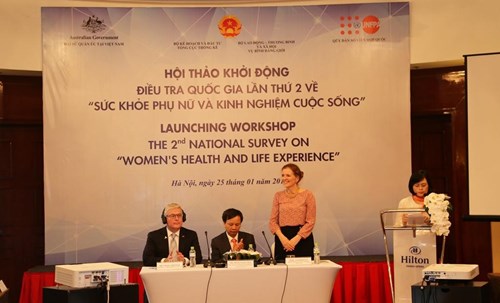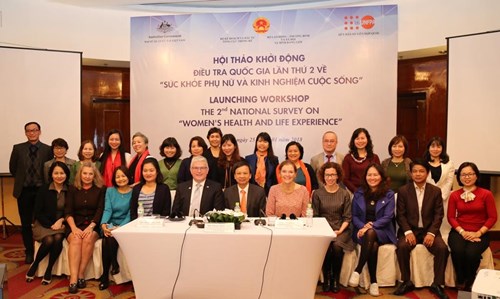    |
 |
|
Australian Ambassador HE Mr Craig Chittick (left), Mr Pham Ngoc Tien, Director of the Gender Equality Department of MOLISA (middle) and Ms Astrid BANT, UNFPA Representative to Vietnam (right) |
Participating in the event were Mr. Pham Ngoc Tien, Director of Gender Equality Department of MOLISA; Mr. Craig Chittick, Australian Ambassador to Vietnam; and Ms. Astrid Bant, Representative of UNFPA in Vietnam; together with representatives from MOLISA, General Statistics Office, other line ministries, representatives from Northern provinces, UN agencies, development partners and both international and local NGOs.
Violence against women and girls (VAWG) is a serious human rights violation and has harmful socio-economic consequences. According to the National Survey on Violence Against Women in Vietnam conducted by the General Statistics Office (GSO) and supported by the United Nations in Vietnam, in 2010, 58 per cent of ever-married women aged from 18-60 have experienced violence at least once in their lives. Of huge concern is that up to 87 per cent of women suffering from violence do not seek any support from public service providers. The study confirmed that violence against women in Vietnam is a serious problem. However, this is only the figure on violence against women within family settings.
Vietnam made good progress on its gender equality targets under Millennium Development Goal 3. The national legal framework for gender equality and women’s empowerment has been strengthened. However, prevalence of VAWG remains high and poorly addressed. Therefore, the study will allow for reliable estimates of key indicators on violence against women and girls for the six economic-geographical regions, for urban and rural areas, for Kinh and non-Kinh populations, and for the entire country.
Addressing the event, Mr. Pham Ngoc Tien, Director of Gender Equality Department of MOLISA said: "In order to develop appropriate, effective and practical policies, apart from staff's capacity, we need reliable data and information as evidence for guiding and building laws and policies. I also hope that the data collected from this survey will continue to be further analyzed to understand different effects of violence on the country's socio-economic development. The data collected will be very helpful for policymakers, programmers at national and provincial levels, Government agencies, social organizations, services providers for GBV survivors, communities and people in the society."
The Australian Ambassador to Vietnam Mr. Craig Chittick said: "Data on women and girls’ experience of violence is the critical first step in providing a just and adequate response to the problem. Most importantly, it also shows women and girls that we believe them, and that we have the courage to address this hidden harm."
    |
 |
|
Partners in the second National survey on Women's Health and Life Experience |
Ms. Astrid Bant, UNFPA Representative in Vietnam said: "We are very happy to collaborate with the Australian Embassy in Vietnam to support Vietnam in conducting the second national survey on Women's Health and Life Experiences. I hope this study will help us collect up-to-data and measure the impact of joint efforts in ending violence against women and girls in the last decade. Let's work together towards a Vietnam where no woman should have to live in fear, no matter where she is, and where all women are treated with dignity and respect."
With technical assistance of UNFPA in Vietnam, the 2nd national survey will be implemented by GSO in March 2018. MOLISA will be the leading agency in coordinating this survey, as well as in disseminating the results in early 2019, and advocating for using data in the development, implementation and monitoring the VAWG related programs and policies in Vietnam.
Reported by Binh Chau-Hoang Bac